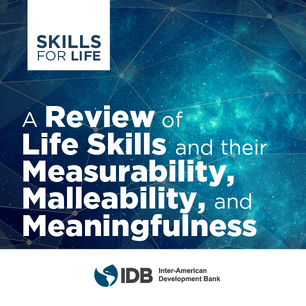Skills for life: A review of life skills and their measurability, malleability, and meaningfulness
Date
Aug 2022
It is widely accepted that schools and other settings catering to youth can play an essential role in offering education in life skills and character. However, there exists a broad array of potential targets for such programs, suggesting the need for guidance on which targets are most likely to result in demonstrable and valuable results. This report attempts to integrate a broad literature addressing the universe of targets for skills development programs for youth. After identifying a set of 30 candidate skills to investigate further, research literature was reviewed to evaluate each skill on three dimensions. Measurability had to do with the extent to which adequate measurement tools were available for evaluating skill level, with emphasis on those tools specifically used for younger populations and available in multiple languages, particularly in Spanish. Malleability had to do with the extent to which there is evidence that interventions have the potential to modify skill level, with emphasis on those that have been extensively evaluated through randomized controlled trials. Finally, meaningfulness had to do with the extent to which evidence exists demonstrating that the higher levels of skill can result in consequential outcomes. Based on these criteria, 10 skills were selected for further review as having the most compelling evidence to date that they are life skills that matter: Mindfulness, Empathy and compassion, Self-efficacy/ Self-determination, Problem solving, Critical thinking, Goal orientation and goal completion, Resilience/Stress resistance, Self-awareness, Purposefulness, and Self-regulation/Self-control/Emotion regulation. The evidence for each is summarized. We finish with a review of key issues to consider in the design, implementation, and evaluation of life skills that matter.




